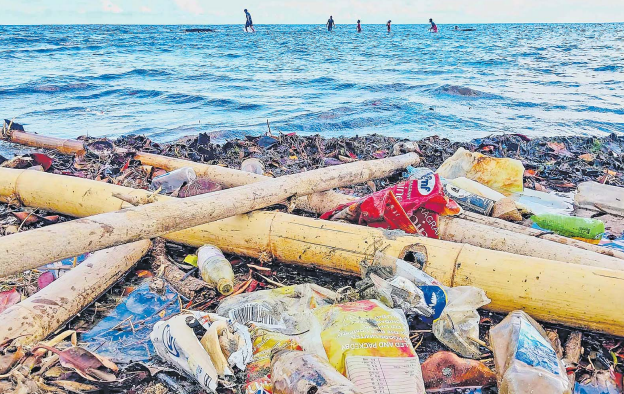The postcard-perfect imagery of Fiji — turquoise waters, lush rainforests, smiling faces — collides violently with a harsh, pervasive reality: Our islands are drowning in our own waste. From the plastic bags snagged in mangrove roots to the bottles bobbing in once-pristine rivers, from the overflowing bins in Suva to the litter-scattered edges of remote villages, Fiji faces a littering epidemic that is not just an eyesore, but a profound moral failing.
Our uncontrolled dumping, from our very own compounds to our highways, chokes our environment and shames the very notion of Fiji as a “paradise.” This isn’t merely an environmental crisis; it’s a crisis of mindset, responsibility, and collective self-respect.
Look around. Our rivers, the lifeblood of ecosystems and communities, are clogged with refuse. Our streams, where children once played, are often toxic trickles. Our streets and roadsides are treated as open landfills. The act of casually tossing rubbish from a car window, dumping household waste over the seawall, or leaving picnic debris on the beach, has become normalised.
This isn’t accidental pollution; it’s a conscious, daily choice made by countless Fijians. It speaks of a staggering disregard for our shared home, our neighbours downstream, and the generations who will inherit this mess. How can we boast of vuvale and vanua, when we treat both with such contempt?
The root of the rot: A broken mindset
The cryptic note urging Fiji to “remove the mindset” hits the nail on the head. Our littering crisis is fundamentally a crisis of mindset. It’s the mindset that believes:
q “Someone else will clean it up”: A dangerous abdication of personal responsibility, expecting overburdened municipal workers or mythical “others” to deal with the consequences of our actions.
q “Out of sight, out of mind”: The delusion that tossing rubbish into a ravine, river, or ocean makes it disappear, ignoring its devastating journey and impact on marine life, water quality, and ultimately, our food chain.
q “It’s just a small piece, what difference does it make?”: A failure to grasp the cumulative effect of millions of “small pieces” discarded daily by a population of nearly a million people.
q “This is just how it is”: A defeatist attitude that normalises the filth, breeding apathy and inaction.
This mindset is the “elephant” in the room – large, destructive, and seemingly immovable. Or perhaps it’s the “chain” that binds us to old, shameful habits. It’s certainly the “chair” we lazily sink into instead of standing up for cleanliness. Breaking this chain requires conscious, collective effort.
Glimmers of hope and the path forward: Rewiring responsibility
A recent inspiring story of Lami Methodist Youth stepping up to keep community clean, offers a vital blueprint. These young people, braving the rain not for reward, but for responsibility embody the shift we desperately need. Assistant Minister for Office of the Prime Minister Sakiusa Tubuna’s words ring true: “This change begins with us.”
The youth are showing the way, proving that voluntary action and community spirit can make a tangible difference. Their actions challenge the apathy and demonstrate that caring for our environment is an act of pride, not a burden.
The Japanese embed cleanliness, responsibility, and respect for shared spaces into the fabric of education from a young age — having students clean their own classrooms and toilets — Japan cultivates a societal ethic where littering is unthinkable. It teaches humility and respect for the work that goes into maintaining order. This is where our most critical opportunity lies: Starting with our children and grandchildren.
We must break the generational cycle of littering. It begins at home, in our compounds, and in our villages:
1. Model responsible behaviour: Children learn by watching. Every time an adult carefully places rubbish in a bin, picks up litter they see, or properly stores waste until collection, they teach a powerful lesson. Conversely, every careless toss reinforces the wrong mindset.
2. Explicit education: Talk to our children. Explain why litter is harmful — to fish, to birds, to our water, to our health, to Fiji’s beauty and reputation. Make it a matter of pride to keep Fiji clean.
3. Integrate into school life: Advocate for and support schools in implementing practical environmental education. This shouldn’t just be theory; involve students in clean-up projects, proper waste sorting, and maintaining their school environment, emulating the Japanese principle. Make “keep Fiji clean” an active part of the curriculum and school culture.
4. Empower youth leadership: Support and amplify initiatives like the Lami MYF. Provide platforms for youth voices demanding a cleaner future. Their energy and idealism are contagious and essential.
5. Demand infrastructure and enforcement: While mindset is primary, accessible bins, regular waste collection (especially in rural and peri-urban areas), and consistent enforcement of anti-littering laws are necessary supports. Communities and authorities must work together.
The choice before us
Fiji stands at a crossroads. We can continue down the path of careless degradation, allowing our “paradise” to be defined by choking rivers and litter-strewn landscapes, perpetuating a cycle of shame for our children. Or, we can choose the harder, more honourable path. We can confront our destructive mindset. We can take personal responsibility for every piece of waste we generate. We can champion the youth leading by example. And, most critically, we can dedicate ourselves to teaching our children and grandchildren a different way — a way of respect for our vanua, responsibility for our actions, and pride in a Fiji that is truly clean.
The litter choking our islands is a mirror reflecting our collective choices. It’s time to break the chain of apathy, remove the mindset of neglect, and choose a future where Fiji’s beauty isn’t just skin deep, but a reflection of the care and respect nurtured in the hearts and habits of every citizen, starting with the youngest. Our paradise is worth the effort. Let’s stop littering our legacy.



